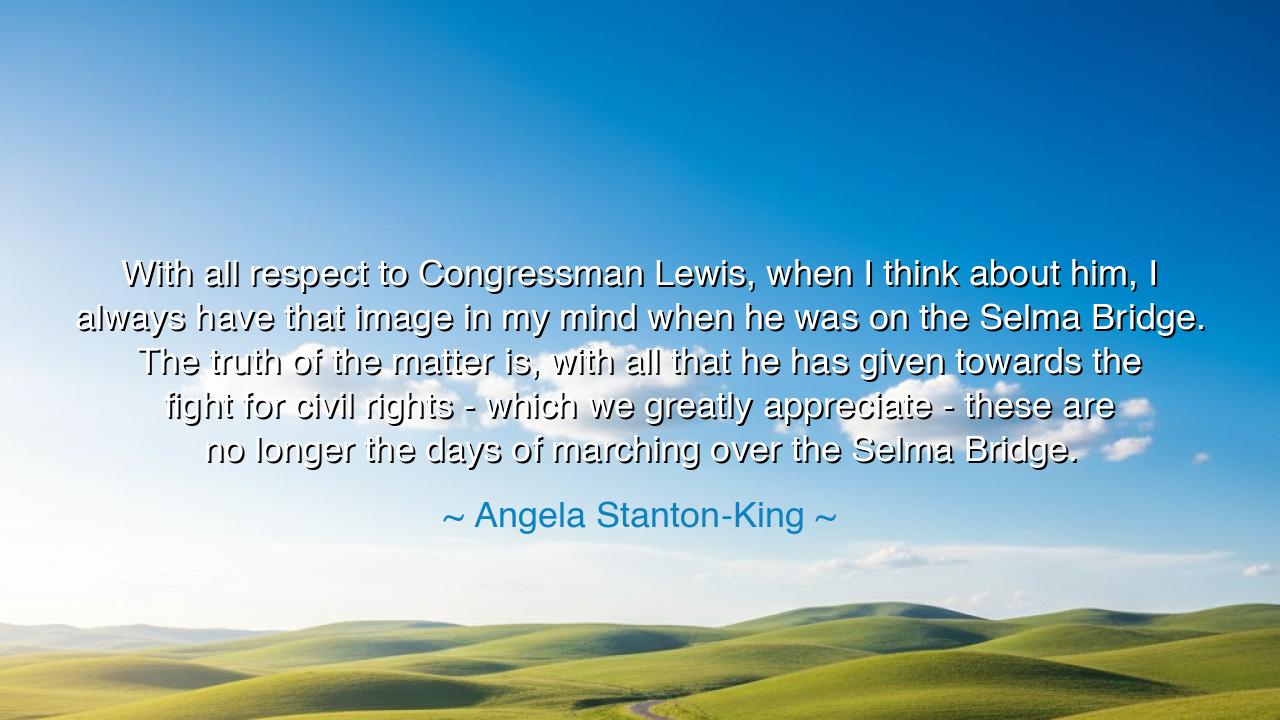
With all respect to Congressman Lewis, when I think about him, I
With all respect to Congressman Lewis, when I think about him, I always have that image in my mind when he was on the Selma Bridge. The truth of the matter is, with all that he has given towards the fight for civil rights - which we greatly appreciate - these are no longer the days of marching over the Selma Bridge.






When Angela Stanton-King declared, “With all respect to Congressman Lewis, when I think about him, I always have that image in my mind when he was on the Selma Bridge. The truth of the matter is, with all that he has given towards the fight for civil rights — which we greatly appreciate — these are no longer the days of marching over the Selma Bridge,” she invoked the memory of a sacred struggle, and at the same time pointed to the ever-changing nature of battles for justice. Her words are both reverent and challenging: reverent toward the sacrifices of the past, yet challenging in their insistence that new eras require new strategies.
The meaning of her words lies in the contrast between memory and present reality. Congressman John Lewis was one of the giants of the American civil rights movement, a man whose body bore the scars of that march across the Edmund Pettus Bridge in Selma. His courage, his willingness to face batons and blood for the cause of equality, is etched forever into the conscience of humanity. Stanton-King acknowledges this heroism, paying respect, but she also insists that the struggles of today cannot be fought by merely reliving the images of yesterday. To cling only to the past, she suggests, is to risk blindness to the demands of the present.
The origin of this truth reaches back to the very nature of human progress. Every generation has its bridge to cross, but the rivers beneath them are never the same. For Lewis and his companions, the Selma march was the crucible through which voting rights were forged. But Stanton-King argues that in a later era, the tools of battle must shift. The forms of oppression change, the structures of injustice evolve, and so too must the strategies of those who seek liberation. What honored the past must inspire, but not confine, the future.
History shows us this pattern clearly. The Hebrew prophets called Israel not only to remember the Exodus, but also to act anew in their own days of corruption and exile. In Rome, Cicero honored the Republic’s ancient founders, yet urged his peers to adapt to new threats that those founders never imagined. In the same way, Stanton-King’s words echo an ancient principle: reverence for the past is righteous, but clinging to its methods without adaptation is folly. To cross the bridges of the present, one must use the wisdom of the ancestors, but also the tools of the moment.
We must not mistake her words for disdain. She does not deny the greatness of Lewis, nor the necessity of the Selma march. Instead, she calls her listeners to a deeper responsibility: to build upon that sacrifice rather than merely enshrine it. The civil rights won by Lewis and his peers were bought with blood and pain. To honor them is not only to remember, but to extend the fight into new arenas — schools, prisons, economies, technologies — where inequality still lurks.
The lesson, then, is profound: the struggle for justice is eternal, but its form changes with each generation. The Selma Bridge remains a holy symbol, but we are summoned to cross bridges of our own: bridges of systemic reform, of cultural healing, of unity in a fractured age. To live in the shadow of Lewis is noble, but to walk in his spirit demands fresh courage, not repetition of old rituals. The spirit of Selma is not bound to that march; it lives in every act of truth and justice we carry into our own time.
Practical actions must follow. Learn from the heroes of the past, but do not stop at admiration. Identify the injustices of your own day — whether in how people are treated because of their race, gender, class, or voice — and dedicate yourself to confronting them. Teach the story of Selma, but also write new stories of triumph and healing. Above all, remember that respect for the past is proven not by nostalgia, but by action in the present.
Thus, Angela Stanton-King’s words remind us: the Selma Bridge was crossed, but there are other bridges before us now. May we honor Lewis and all who marched with him, not by standing still at the memory, but by walking forward into the battles that await us today. For this is the way of justice — a flame passed from generation to generation, each tending it in their own time, until the world is set alight with freedom.






AAdministratorAdministrator
Welcome, honored guests. Please leave a comment, we will respond soon